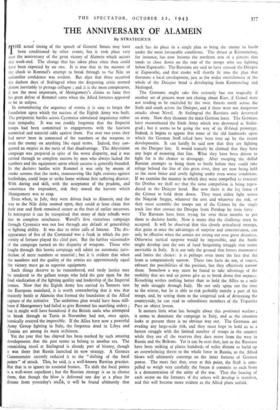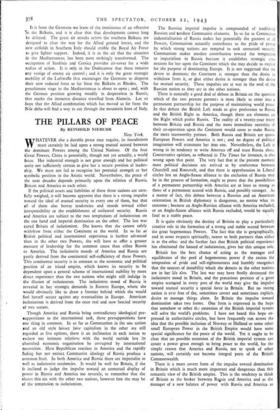THE ANNIVERSARY OF ALAMEIN
By STRATEGIUS In remembering the sequence of events it is easy to forget the foundation upon which the success of the Eighth Army was built. The peripatetic battles across Cyrenaica stimulated impatience rather than sympathy. It was too readily forgotten that the Imperial troops had been committed to engagements with the heaviest numerical and material odds against them. For over two years they had never been in command of the numbers or the weapons to meet the enemy on anything like equal terms. Indeed, they con- quered an empire in the teeth of that disadvantage. The Abyssinian campaign was prepared in spite of the worst disparity, and it was carried through to complete success by men who always lacked the numbers and the equipment upon which success is generally founded. In the decisive battles with Rommel it was only by means of smoke screens that the tanks, manoeuvring like light cruisers against battleships, could hope to strike home without first suffering disaster. With daring and skill, with the acceptance of ' the prudent, and sometimes the imprudent, risk they sowed the harvest which Montgomery was to reap.
Even when, in July, they were driven back to Alamein, and the way to the Nile delta seemed open, they could at least claim that their rear and flank remained secure as the fruit of earlier successes. In retrospect it can be recognised that many of their rebuffs were due to complete mischance. Wavell's first victorious campaign through Cyrenaica was not lost through any default of generalship or fighting ability. It was due to other calls of honour. The dis- appearance of five of the Command was a freak in which the per- versity of fortune played the chief part. But the further vicissitudes of the campaign turned on the disparity of weapons. Those who fought through this heroic campaign will admit no automatic juris- diction of mere numbers or material ; but it is evident that when the numbers and the quality of the armies are approximately equal the victory must go to superior equipment.
Such things deserve to be remembered, and tardy justice may be rendered to the gallant troops who held the gate open for the final vindication of the fighting quality and leadership of the Imperial armies. Now that the Eighth Army has carried its banners into the European mainland, it is worth remembering that it was that masterly battle at Alamein that formed the foundation of the Allied capture of the initiative. The ambitious plan would have been still- born if Montgomery had failed to give Rommel his marching orders ; but it might well have foundered if the British units who attempted to break through to Tunis in November had not, once again, heroically essayed the impossible. If the Allies have now a powerful Army Group fighting in Italy, the forgotten dead in Libya and Tunisia are among its main architects.
Yet the year that has elapsed has been marked by such amazing developments that the past seems to belong to another era. The astonishing recoil at Stalingrad is already part of history, though it was there that Russia launched its new strategy. A German Commentator recently reduced it to the " shifting of the focal points " of attack. This, he said, is a well-known Russian practice. But that is to ignore its essential feature. To shift the focal points is a well-worn expedient ; but the Russian strategy is so to choose them, that though the blow is delivered one day at a place far distant from yesterday's attack, it will be found ultimately that each has its place in a single plan to bring the enemy to battle under the most favourable conditions. The thrust at Kremenchug, for instance, has now become the northern arm of a pincers that tends to close down on the rear of the troops who are fighting below Zaporozhe. The Russians are said to have crossed the Dnieper at Zaporozhe, and that stroke will shortly fit into the plan that threatens a local envelopment, just as the wider encirclement of the whole of the Dnieper bend is developing from Kremenchug and Melitopol.
The Germans might take this seriously but not tragically if another set of pincers were not closing about Kiev, if Gomel were not tending to be encircled by the twin thrusts north across the Sozh and south across the Dnieper, and if there were not dangerous attacks about Nevel. At Stalingrad the Russians only destroyed an army. Now they threaten the main German force. The Germans have reconstituted the Sixth Army which was destroyed at Stalin- grad ; but it seems to be going the way of its ill-fated prototype. Indeed, it begins to appear that some of the old landmarks upon which the German Staff relied have been torn up by the recent developments. It can hardly be said now that they are fighting on the Dnieper line. It would scarcely be claimed that they have any hope of restoring that line. What they have been driven to fight for is the chance to disengage. After escaping the skilful Russian attempts to bring them to battle before they could take refuge behind the line of this great river, they are now being held to the most bitter and costly fighting under even worse conditions. If we examine the manner in which they were compelled to evacuate the Donbas we shall see that the same compulsion is being repro- duced in the Dnieper bend. But now there is the leg fetter of the Crimea to hold them down. They must either fight across the Nogaisk Steppe, whatever the cost and whatever the risk, or they must scramble the troops out of the Crimea by the single track line that crosses the Dnieper from Perekop by- train ferry.
The Russians have been trying for over three months to pin them to decisive battle. Now it seems that the challenge must be accepted. It will be observed that this closely articulated strategy, that gains at once the advantages of surprise and concentration, can only be effective when the armies are strung out over great distances. Otherwise tactical surprise would be impossible, and the battle might develop into the sort of hard bargaining struggle that seems inevitable in Italy. It is not only the ground that fetters manoeuvre and limits the choice: it is perhaps even more the fact that the front is comparatively narrow. These two facts do not, of course, ethaust the possibilities of the position, but they effectively narrow them. Somehow a way must be found to take advantage of the mobility that sea and air power give us to break down that impasse. Kesselring wishes nothing better than to hold the Allies to a mile by mile struggle through Italy. He not only spins out the time to the winter, but he is able to risk probably merely a part of his troops, and, by setting them to the congenial task of destroying the countryside, he can read to subordinate members of the Tripartite Pact an object lesson.
It matters little what has brought about this positional warfare ; it seems to dominate the campaign in Italy, and as the situation looks at present there is no obvious way out. The Germans are evading any large-scale risk, and they must hope to hold us to a barren struggle with the limited number of troops in the country while they use all the reserves they dare move from the west in Russia and the Balkans. Yet it can be seen that, just as the Russians have been striking at places hundreds of miles distant to build up an overwhelming threat to the whole force in Russia, so the Allied blows will ultimately converge on the inner fortress of German power. The mere fact that, even at this point, the Staff is com- pelled to weigh very carefully the forces it commits to each front is a demonstration of the unity of the war. That the bearing of each sector on the fortunes If the others will develop is manifest, and this will become more evident as the Allied plans unfold.
It is from the Germans we learn of the imminence of an offensive lin the Balkans, and it is clear that that development cannot long be delayed. The great air attacks across the southern Balkans are designed to clear the way for the Allied ground forces, and the new airfields in Southern Italy should enable the Royal Air Force to give fighter support. Indeed, it is in the, air that the situation in the Mediterranean has been most strikingly transformed. The occupation of Sardinia and Corsica provides air-cover for a wide radius of action. It is only in the Dodecanese that there remains any vestige of enemy air control ; and it is only the great strategic mobility of the Luftwaffe that encourages the Germans to disperse their now reduced force so far from the Balkans as Rhodes. The penultimate stage in the Mediterranean is about to open ; and, with the German position growing steadily in desperation in Russia, that marks the immense distance travelled from Alamein. Let us hope that the Allied combination which has moved so far from the Nile delta will find a way to cut through the mountain knot of Italy.



























 Previous page
Previous page